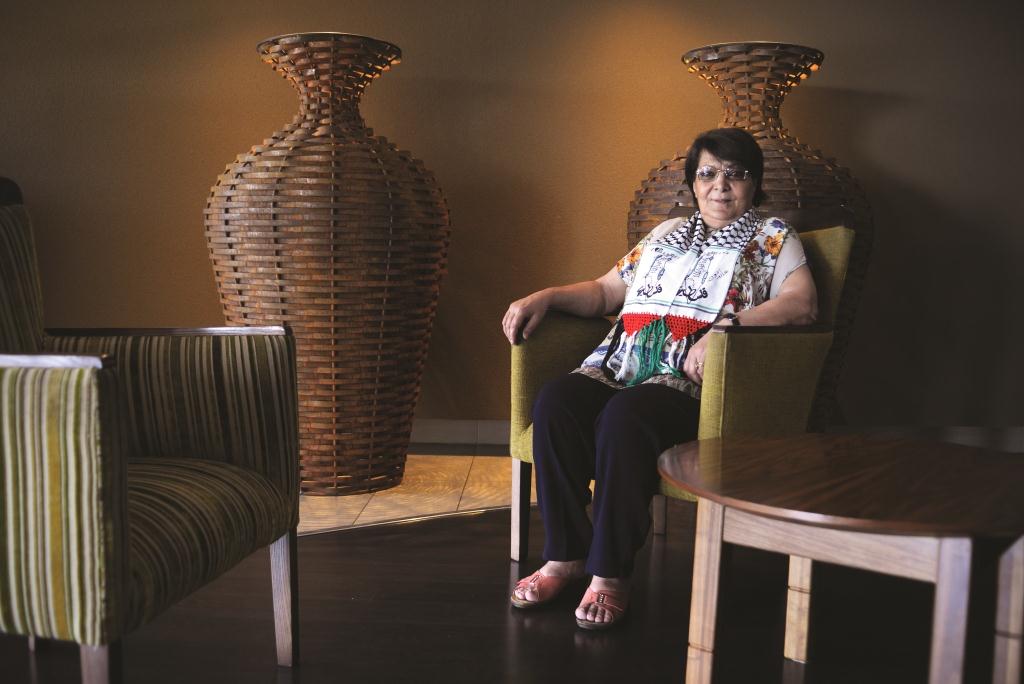There’s a certain attention that a lone Kalashnikov rifle commands. Even more so when it is carried by a woman wearing a keffieh (the chequered scarf once used as the symbol of the Palestine resistance movement). This is exactly how the world learned to know of Leila Khaled.
What made the Palestine-born activist a terrorist was not the rifle but the first time she played a part in hijacking a plane in 1969, while still in her 20s.
It was after this hijacking that the now-iconic photo (see next page) of Khaled holding the Kalashnikov was taken by American photographer Eddie Adams. Khaled since underwent six facial surgeries to change her appearance, which also allowed her to participate in the second plane hijacking in 1970.
Her cause? That of the Palestinians, and their right to return to their homeland as a free people.
Today, at 70, she’s a mother of two sons and has a granddaughter she dotes on. The Palestinian Right to Return, as she explains during her visit to Johannesburg in February, is just as close to her heart.
Loading...
“It’s very important to put the Palestinian question on the international agenda. After the first intifada [Arabic word for resistance] in 1987, it was a widespread awareness about the Palestinians because we did not, up to now, achieve our goals, in return for the refugees [to go back] to their homeland, to their cities, villages, properties,” says this member of the Popular Front for the Liberation of Palestine (PFLP).

“The Right of Return is still a dream. We cannot practice our self-determination without being in our land, and to establish an independence.”
Khaled’s visit to Johannesburg was however not without controversy. Her visit was organized by the Boycott, Divestment and Sanctions South Africa (BDS South Africa), which is part of the global campaign aimed at pressurizing Israel to end its occupation of Palestinian land.
The South African Jewish Board of Deputies (SAJBD), alongside a number of other parties, were quick to condemn the visit before Khaled had arrived, and continued to do so. The SAJBD issued a statement against Khaled’s visit and BDS South Africa’s role in bringing her to the country, adding to the recent tension between South Africa’s Jewish and pro-Palestine groups.
Despite the tense backdrop to her visit, Khaled is nevertheless vocal about the Israel and Palestine conflict, and her crucial duty to fight for her people.
“Israel is still having [exclusions] against our people, in the West Bank and in the Gaza strip, and lately they have [committed] a holocaust for the Palestinians in Gaza. Now Israel denies all rights of Palestinians,” she says.
The Israeli-Palestine conflict has now become a focus of the International Criminal Court, and the Hague-based power could prosecute both parties for war crimes. At the center of any conflict, however, are women and children, and especially at a time where civilians have now become the target. Rape and systematic sexual assault is also a weapon of war, and according to Khaled, a societal ill that has taken too long to remedy.
“[These challenges] should be supported by civil society. It’s not just by one person. It needs time, it needs education, and the steps for the betterment of the people. It doesn’t mean that everything is okay. There are many big challenges facing not only the government, but society as well,” she says.
While there are societies in which some women have succeeded alongside men, statistics point to the gaping gender pay gap.
“[There is still a need] to have consciousness about the woman as a human being, not as a sex. Women’s rights are part of human rights, so if any country doesn’t apply this to its rules and laws, it means that they are violating human rights,” says Khaled.
Her active role extends beyond her iconic photograph, which has also become a part of popular culture, the same way Che Guevara’s image is emblazoned on T-shirts. The keffieh, which has been used as a symbol of Palestinian resistance and support, is now a fashion accessory. The message these symbols carry, according to Khaled, is however not lost.
“When I look at Che Guevara as a symbol, and also Nelson Mandela as a symbol of the struggle against injustice, whether it’s under [the] apartheid regime or [not], it’s not the whole thing that I see. I see behind it,” she explains.
“It means that this image should be in [popular] culture. We should learn from history, from other people. It’s not only our people who are struggling, there were many other people in the world who struggle.”
Young Khaled’s image is almost timeless as it speaks for the many women on the frontline, taking on an equal role alongside men in conflicts around the world.
Loading...
